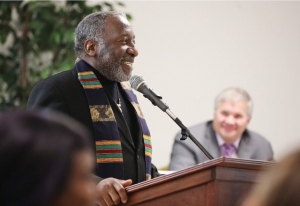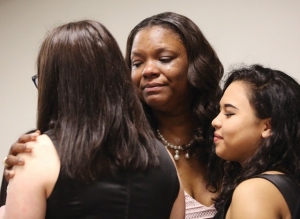Speaking on Silence: Martin Luther King Jr. Holiday Luncheon speaker challenges audience
By Rochelle Moore
Published in News on January 17, 2017 8:16 AM

News-Argus/CASEY MOZINGO
Keynote speaker Reverend Kojo Nantambu laughs with the audience during the annual Martin Luther King Jr. Day celebration at Goldsboro - Raleigh Assembly Church Monday.

Event organizer Shycole Simpson-Carter cries as she thanks members of the Eastern Wayne High School chorus Monday after they sung Bridge Over Troubled Water during the annual Martin Luther King Jr. Day event at the Goldsboro - Raleigh Assembly Church.
The speaker at the 29th annual Martin Luther King, Jr. Holiday Luncheon Monday didn't focus on the slain civil rights leader's "I Have a Dream" speech.
Instead, he centered his message on words King spoke during the Vietnam War -- "When silence becomes betrayal" -- which ended his relationship with the president and came one year before his assassination.
"It was taken from his most controversial speech, delivered April 4, 1967, at the Riverside Church in New York," said the Rev. Kojo Nantambu, director of the Religious Emphasis Advocacy Project of the North Carolina NAACP Conference.
"For those of you who don't know, that speech was the precursor to his death. It was his death knell. That was the sermon he preached about the war in Vietnam and after that particular speech, President (Lyndon) Johnson never spoke to him again because he spoke truth to power."
Nantambu, who spoke to nearly 400 people at the Goldsboro-Raleigh District Assembly, Church of Christ, Disciples of Christ, said the silence can be most seen in the lack of voters heading to the polls during the November election.
"When silence becomes betrayal is probably the most adequate way to evaluate one of the factors that seriously impacted the most recent elections, local, state and national," he said. "Half of all the people in this country, especially in this state who are registered to vote in the last election did not vote. That silence became critical across the nation, especially in the state of North Carolina. It allowed the most vicious, inhumane, mean-spirited, unconscionable group of politicians in the history of the state of North Carolina to remain in the General Assembly."
Nantambu questioned Republican leaders in the General Assembly who failed to support the expansion of Medicaid, supported voter identification laws and passed the controversial House Bill 2.
"It is obvious that our General Assembly and our Congress have no concept of God or justice," he said. "If they did, they would understand the plight of the poor and that the book that they took an oath on says take care of the poor, the widows and the orphans."
Denying an expansion of Medicaid has affected hundreds of thousands of people, including the elderly, the handicapped and children, he said.
Nantambu attributes the lack of adequate health care as being a larger contributor to death than cancer or heart disease.
"The Congress and General Assembly members get the best health care in the world, compliments of the taxpayer, but, yet, they are too inhumane to consider a decent health care program for the very people who put them in office," he said.
Nantambu said that the silence of Americans, as laws are passed and other decisions are made across the nation, is allowing the crumbling of democracy, the resurgence of racism, bigotry, white supremacy and the "suffocating hand of old Jim Crow."
Nantambu called HB2 a "deceptive" bill with provisions that extend beyond the requirement that people visiting schools and other government buildings use the bathroom of the gender that appears on their birth certificate.
"House Bill 2 had couched in it, a bill that says that as a citizen of the state of North Carolina, you no longer have the power or the right to file a lawsuit against an employee who discriminates against you," he said. "As a citizen in North Carolina, House Bill 2 also says that companies in North Carolina do not have to give you minimum wages ..."
The law restricts local government from requiring contractors pay specific wages or provide benefits as a condition when bidding for government jobs. The law also prohibits local government from enacting regulations that ban discrimination.
Nantambu said HB2 is in conflict with federal law.
"We've got to make sure that we fight for the fact to make sure that federal rights continue to override state's rights because state's rights only benefit a few," he said.
Nantambu also criticized legislative attempts to block the power of Gov. Roy Cooper prior to his inauguration, and president-elect Donald Trump who he said is "acting like the God of America," before he takes office.
Nantambu said that the Rev. Dr. Martin Luther King Jr. often faced conflict, death threats and other challenges in his fight for civil rights.
He also quoted Frederick Douglass who said: "Power concedes nothing without a demand. It never did, and it never will."
"So you've got to stand up," Nantambu said. "You've got to stop sitting down. Martin (Luther King Jr.) said, 'in spite of all the hardship, all the struggle, the arc of the board of the universe is long and bends toward justice.'
"You can talk about how much you don't like what's going on in North Carolina but until you get off your rusty dusty, and get out there and start doing something . . . unless you say something against this unholy, this ungodly thing we're living in, then you are as guilty as anybody else."
Nantambu, a civil rights pioneer from Wilmington, said his keynote address Monday was not as a representative of the NAACP.
The luncheon included words from Mayor Chuck Allen, Wayne County Commissioner Ed Cromartie and Davia Webb, chairperson of the Goldsboro Mayor's Youth Council.
The Eastern Wayne High School Vocal Ensemble also sang, "Bridge Over Troubled Water."
Allen, who recognized African-Americans as a majority of the city's population, more than 60 percent, asked those in attendance to become more involved in making the city better.
"We do have issues," Allen said. "We have too many gang members in Goldsboro. We have too much poverty. We don't have enough equal opportunity. We don't have enough inclusiveness. We have too much blight.
"I implore all of you to do what you can to help make this city better for all of us. The one thing I know is if we stay together, we communicate together, we pray together and we collaborate together, at the end of the day, this will be a better city."
